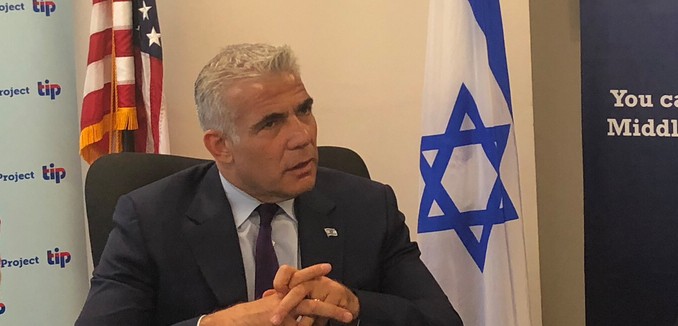In an exclusive press briefing hosted by The Israel Project in Washington, D.C. on Monday, Israeli opposition leader Yair Lapid said “Israel will not tolerate an Iranian presence in Syria. Period.” If diplomatic negotiations fail to resolve the crisis, Lapid insisted, Israel “will take any measures necessary.”
Lapid – one of the most prominent politicians in Israel as head of the liberal party Yesh Atid – observed that the growing Iranian threat in the region had led to a tectonic shift in the Middle East, making room for new alliances. Shadow diplomacy between Israel and the Arab States “is a good thing,” Lapid commented. In contrast, “Iran putting boots on the ground in Syria, and having Turkey gradually becoming part of this, is the new Axis of Evil.”
Even if the anti-Iran alliance is a “quiet one,” Lapid sees in it a chance to normalize relations between Israel and the Arab world.
When asked what he thought of the JCPOA, the nuclear deal signed with Iran in 2015, and America’s decision to withdraw from the agreement, Lapid replied he was “totally aligned with the Israeli government” in that it was a bad deal. He expressed concerns over the verification mechanisms, Iran’s ballistic missiles program, the sunset provisions, and failure to address Tehran’s proliferation of terrorism.
The sanctions regime was an effective tool to keep Iran in check and, with the JCPOA, was replaced with something less effective – a bad decision according to Lapid. Looking into the future, he predicted it would be “possible to push the Iranians into a better deal.”
“Last time I checked, the rial was at its all-time low compared to the dollar. This is the kind of economy that cannot last long under real pressure,” he said.
Key to rolling back Iran’s presence in the region was to work with Russia in Syria, Lapid insisted, hailing the cooperation between Jerusalem and Moscow in the neighboring state. “Russia is calling the shots in Syria, which is due to the fact that the Unites States decided not to be present,” he explained, clarifying he was “not criticizing, just observing.”
When asked if Russia has the power to keep Iran out of Syria, Lapid said “they can do that; or they can pressure Assad; or understand that we are going to do it if no one else will.”
Considering the volatile situation on Israel’s border, Lapid urged the United States to recognize Israeli sovereignty over the Golan Heights. “There were all kinds of discussions throughout the years, but this is over, because it is so obvious that nobody in their right mind is going to give the Golan Heights to a mass murderer who just killed half a million of his own people.”
Referring to the crimes committed by the regime of Bashar al-Assad with the support of Iran, including the use of chemical weapons against civilians, Lapid insisted that any Israeli handover of territory to the regime was off the table — and that it was time for the international community to recognize that.
“Now that the risks are so obvious, we will never renegotiate the Golan Heights,” he said. “It’s ours and always has been. It’s not like the West Bank or anything.”
Reflecting further on developments in the region, Lapid charged “Turkey is not a democracy anymore.” The same political circles which castigate Israel, the only liberal democracy in the Middle East, turn a blind eye to the situation in Turkey.
He observed that “Turkey has no interest in human rights. It is an Islamic autocracy. And it has no place in NATO (…) we are all playing a dangerous game for not recognizing Turkey for what it really is.”
Lapid continued: “If a leader of a country controls the national media; if he is imprisoning journalists and opposing leaders; if you are not allowed to say what you want; to say and if you cannot cover the election in a way you want while there are strong rumors of forgery, then it is no longer democracy.”
“We are misguided about what democracy means today,” Lapid concluded.
[Photo: The Israel Project]




